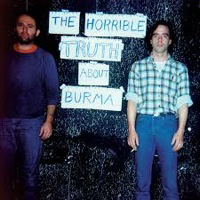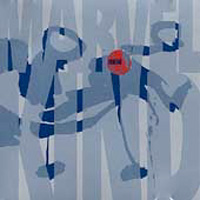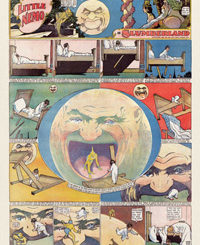 Mission of Burma
Mission of Burma
The Horrible Truth About Burma (Rykodisc)
by Nik Rainey
In music, as in sports, high culture and politics (but not political scandal, where we seem to be leading the country at present), Boston has long been reliable but rarely ever innovative. At any given time, one or more of our emissaries hold places of prominence on the charts or in the underground buzz circuit, but almost never have they engaged in the kind of forward-looking musical adventurism that forever alters the way music is heard and played. To be fair, only a handful of bands hold such a place of honor – the Velvets, the Stooges, the Ramones, Hüsker Dü and Nirvana are the names that spring quickly to mind as examples of guitar-based bands that scrambled the existing vocabulary into fresh configurations, and it’s no coincidence that, with the obvious exception of the last name on the list, they were all groups whose impact was truly understood and felt by an elite audience of musicians, critics, and discerning fans in their time with a minimum of commercial acknowledgment. But our fair-to-slightly-above-average city does have one innovator to its credit, a band of late-seventies youths barely noticed outside of their hometown who took the aggression of punk, the experimental gambits of European art-rock, and the anthemicism of American pop, and reconfigured them into a bracing, noisome brand of tsunamic sound, avant-garde music you could shake your fist to, and that band was Mission of Burma.
Fittingly, Salem-based Rykodisc, the very model of digital-age reissue campaigns, has given this seminal band of locals the recognition they never received in their brief (1979-82) existence. In 1987, they released what remains the longest commercially-released CD, compiling Burma’s first two releases and a handful of single sides, live tracks and rarities onto a single eponymous disc running eighty minutes in length. Now, a decade on, these overachievers have topped themselves, engaging original producer (and owner of Ace of Hearts Records) Richard Harte to remaster each of Burma’s three vinyl LPs for separate CD issue, packing each with bonuses and finally doing full justice to the tense, layered density that made Mission such a sonic knockout.
Like every important band, Mission of Burma was the sum of several distinctive parts in an exciting collision. Guitarist Roger Miller brought a barely-contained frenzy to his instrument, twisting it into abrasive, obtuse knots that filtered the cacophony of industrial-age jazz and classical composers through the inventive meltdown of Midwest art-punk and the nuclear-garage fury of early-seventies Detroit. Bassist Clint Conley had a melodic sensibility that resulted in most of their catchiest hard-pop sing-alongs. Drummer Peter Prescott held the mania together with his complex, powerful beats. And Burma’s x-factor, behind-the-board soundman Martin Swope, served much the same function as Brian Eno had in early Roxy Music, using treatments and tape loops to throw their sound back at them in a dizzying, nerve-racking torrent. Few bands’ sounds were as seductively dense without losing their concentrated power.
Their first 45, released in 1980 (and appended to the Signals, Calls and Marches CD), was an immediate masterpiece in which the pre-Swope trio defined the divergent songwriting approaches favored by Conley and Miller. “Academy Fight Song,” the a-side, demonstrated Conley’s unmatched skill at writing tight, aggressive pop songs with a mixture of teenage defiance and existential torment (“What’s that I hear?/The sounds of marching feet?/It has a strange allure”). The flip, Miller’s “Max Ernst” (previously unissued on CD), is even more tightly-wound, invoking the Dada art movement in its surreal lyrics and asymmetrical structure, his gnarled six-string pyrotechnics upping the tension at every turn until giving out with a truly mind-blowing burst of clenched, skidding feedback at the very end. Nerve-racking, exhilarating, absolutely essential.
With Swope in tow (although his manipulations weren’t captured on tape to the band’s liking at the time), Burma quickly followed with the six-song Signals, Calls and Marches EP (1981). Conley only has one solo songwriting credit on the record, but “That’s When I Reach For My Revolver” (recently covered, almost identically, by Moby) was another instant classic, an anthem of desperation so masterful that it almost overshadows Miller’s more difficult contributions. But live with them for a while and his against-the-grain style takes hold, whether it’s the two-minute punk chant “This Is Not a Photograph,” the petit-mal spasms of “Outlaw,” or the oscillating electronics and graceful fast-slow dynamics of “Red.” The closing instrumental, “All World Cowboy Romance,” and the middle section of “Fame and Fortune,” manifest an ability to render power into beauty, distinguishing Burma from the two-dimensional squall of most punk-inspired units.
The only full-length LP recorded during Mission of Burma’s existence,vs. (1982), is the fullest flowering of their harshly lush attack on record, with Miller and Swope pulling everything from their bags of sonic trickery, Prescott spilling his beats everywhere, and Conley and Miller shouting, crooning, and blustering their impatient call-and-response vocals all over each other. And that’s just the first two songs. “Trem Two” evinces the best use of tremolo in a rock song this side of “How Soon Is Now?,” Prescott makes his songwriting debut on the ferocious “Learn How,” and the maddened guitar, muted trumpet, and crazed effects on “New Nails” are so head-spinning, it takes a while to realize what a brutal attack on organized religion it is (“the Roman Empire never died/it just changed into the Catholic Church”). After the disordered hubbub of the first six songs, vs.’ second half gathers their energies into one of the best-ordered sides in indie-rock history. (To these ears, only side one of the Soft Boys’Underwater Moonlight and side three of Hüsker Dü’s Zen Arcade compare.) Conley’s agitated “Mica” segues perfectly into Miller’s superbly layered mid-tempo “Weatherbox,” “The Ballad of Johnny Burma”‘s about as rousing as nihilism gets (“I said my mama’s dead/but I don’t care about it!”), “Einstein’s Day” puts paid to the pretty power-chime of “All World Cowboy Romance,” “Fun World” turns every instrument into a seething, propulsive rhythm tool, and “That’s How I Escaped My Certain Fate” ends the album on a note of white-hot abandon fit to burn out your stereo. (The four bonus tracks, including the great b-side “OK/No Way,” are fabulous.)
Something this volatile was just begging to implode, and when Miller contracted tinnitus from their righteously loud live overload, Burma was forced to call it quits after one last tour, captured for posterity on 1985’s The Horrible Truth About Burma. The previously-unreleased compositions that make up the record (four versions of Signals… and vs. songs, including “Revolver,” are added to the reissue) underscore the tragedy of their premature demise, showing that Burma was far from spent creatively. “Peking Spring” and “Dirt” are incredible Conley compositions, “Dumbells” and “Tremolo” showcase Miller’s ever-inventive guitar histrionics, and their versions of the Stooges’ “1970” and Pere Ubu’s “Heart of Darkness” pay brilliant tribute to two of their most obvious touchstones. A loving monument to a spectacular band.
After the split, each member took his respective approach down vastly different roads. Miller and Swope joined chamber experimentalists Birdsongs of the Mesozoic, after which Swope effectively disappeared and Miller involved himself in a slew of projects (the Binary System being the latest). Prescott has stuck with guitar rock in Volcano Suns, Kustomized, and the Peer Group, and remains a welcome fixture in the Boston scene. Conley, unfortunately, has retired from music (aside from the occasional guest appearance) and is currently a TV producer. Regardless of which way they go, however, this quartet has left behind a small but formidable legacy that will surely continue to enthrall and inspire as only true originals can, a Mission of truly singular accomplishment. Dig in.



